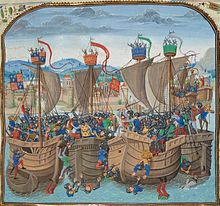This is an old revision of this page, as edited by Peter Isotalo (talk | contribs) at 07:20, 11 May 2015 (then {{synthesis}} it is). The present address (URL) is a permanent link to this revision, which may differ significantly from the current revision.
Revision as of 07:20, 11 May 2015 by Peter Isotalo (talk | contribs) (then {{synthesis}} it is)(diff) ← Previous revision | Latest revision (diff) | Newer revision → (diff)| This article or section possibly contains synthesis of material that does not verifiably mention or relate to the main topic. Relevant discussion may be found on the talk page. (Learn how and when to remove this message) |



Melee (/ˈmeɪleɪ/ or /ˈmɛleɪ/, French: mêlée [mɛle]; the French spelling is also quite frequent in English writing), generally refers to disorganized close combat in battles fought at abnormally close range with little central control once it starts.
The French term was first used in English in c. 1640 (a re-borrowing of a lost Middle English melle, but the Old French borrowing survives in medley and meddle).
In military aviation, a melee has been described as "n air battle in which several aircraft, both friend and foe, are confusingly intermingled".
Lord Nelson described his tactics for the Battle of Trafalgar as inducing a "pell mell battle", or a melee between the fleets, which he was sure would lead to a decisive victory, given the superiority of the Royal Navy.
See also
Notes
- ^ OED 2015.
- Kumar, DeRemer & Marshall 2004, p. 462.
- Fremont-Barnes 2005, p. 38.
References
- Fremont-Barnes, Gregory (2005), Trafalgar 1805: Nelson's Crowning Victory, Osprey Publishing, p. 3838, ISBN 978-1-84176-892-2
- Kumar, Bharat; DeRemer, Dale; Marshall, Douglas (2004), An Illustrated Dictionary of Aviation, McGraw Hill Professional, p. 462, ISBN 978-0-07-178260-9
- "mêlée n.", Oxford English Dictionary (online ed.), Oxford University Press, March 2015
{{citation}}: External link in|chapterurl=|chapterurl=ignored (|chapter-url=suggested) (help)
This military-related article is a stub. You can help Misplaced Pages by expanding it. |